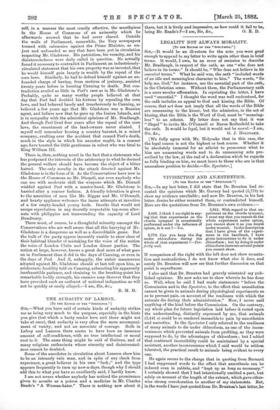VIVISECTION AND ANESTHETICS.
[To THZ EDITOR OF THE " SPECTATOR:9 SIR,—In my last letter, I did state that Dr. Brunton had re- canted the opinions which Mr. Gurney had quoted (5,778) to. show my evidence unreliable ; and now Dr. Brunton, in his last letter, denies he either recanted them, or contradicted himself. Here are the quotations from Dr. Brunton's own evidence:- 5,811. With regard to that ex-
5,805. I think I am right in say- periment on the chorda tympani,. log that that experiment on the I must say that you cannot do the chords tympani is occasionally whole experiment under opium, performed under the influence of you cannot show it as you would
opium, is it not ?—Yes, under wourali. In the description that I have given of the experi- 5,778. Can you keep the dog ment in the handbook, I have under chloroform during the given instructions to do it under whole of that experiment ?—Per. chloroform ; but by doing it under
fectly well, chloroform there are several points you cannot show.
If comparison of the right with the left doe3 not show recanta- tion and contradiction, I do not know what else it does, and surely Dr. Brunton will now see that further discussion on that point is superfluous.
I also said that Dr. Brunton had gravely misstated my pub- lished opinions. He now asks me to show wherein he has done so. Well, when he said I had made statements "before the Commission and in the Spectator, to the effect that anaesthetics cannot be given to animals during physiological experiments so as to prevent pain, on account of the readiness with which the animals die during their administration." Now, I never said anything of the kind before the Commission. On the contrary, my whole plan for future legislation laid before it rested upon the understanding, distinctly expressed by me, that animal's (3,441 o) could be so rendered insensible to pain by anesthetics and narcotics. In the Spectator I only referred to the readiness. of many animals to die under chloroform, as one of the incon- veniences which prevented animals from profiting, as they were supposed to do, by the advantages of chloroform ; but I added that continued insensibility could be maintained by a special assistant, another inconvenience which I said would be seldom, tolerated, the practical result to animals being evident to every one.
He again recurs to the charge that in quoting from Bernard I had suppressed words to the effect that anaesthesia can be induced even in rabbits, and "kept up as long ss necessary." I certainly showed that I had intentionally omitted a part, but solely on account of the length of the extract, which gave other- wise strong corroboration to another of my statements. But, in the words I have just quoted from Dr. Brunton's last letter, he
has unquestionably mistranslated Bernard. In the omitted lines, Bernard is only speaking of an atuesthesiaproduced under a bell- jar, and lasting for a minute or two, when he says that "in case of need, the action may be continued longer" (" au besoin, on continue Faction phis longtemps"), not that the anmsthesia can be "kept up as long as necessary," as Dr. Brunton has wrongly rendered it. Had that translation been correct, it would have been the complete negation by Bernard of what he had said in the previous lines I quoted.
I regret to take up so much of your valuable space with a correspondence which must be uninteresting to the great majority of your readers, but I trust that you will kindly give



































 Previous page
Previous page